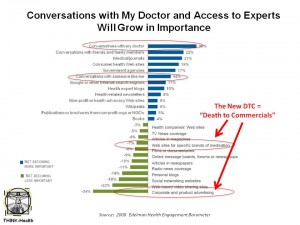Most consumers give thumbs-up to “fair and balanced” information on risks and benefits delivered in prescription drug ads on TV. But online? Not so much.
This finding comes from one of the most highly anticipated surveys in the pharma business, the annual Prevention Magazine consumer survey on direct-to-consumer advertising (DTC). The FDA takes this survey seriously and its results inform FDA approaches to regulation. The 13th annual poll was published on July 15, 2010, titled, Consumer Reaction to DTC Advertising of Prescription Drugs.
Most consumers find that “fair balance,” which is FDA required for presenting risks and benefits, is indeed “fair and balanced” on broadcast and in magazines. However, only 1 in 3 U.S. consumers recognize the risks and benefits in online pharma promotions.
Some of of the detailed findings are that:
- 8 in 10 consumers have seen and heard risk on DTC ads on TV
- 7 in 10 have seen and heard Rx benefits on DTC ads on TV
- Fewer consumers recognize risks and benefits via magazine ads – 1 in 2 have seen and ‘heard’ these in magazines.
- Only 37% report seeing and hearing risks via online DTC ads, and 1 in 2 have seen/heard benefits online.
Rodale, the sponsor of the survey and Prevention’s publisher, surmises that more people ‘get’ Rx benefits and risks via TV and magazines because they’re more used to consuming DTC ads via those media — and online is a newer channel for digesting Rx risks and benefits.
One intriguing finding is that 63% of health consumers are seeking information about alternative treatments.
The survey was cond ucted via telephone in April 2010 among 1,501 adults living in the U.S.
ucted via telephone in April 2010 among 1,501 adults living in the U.S.
Health Populi’s Hot Points: With more TV watchers dis-intermediating commercial messages via TiVo and other digital video recording devices, health consumers have largely moved online to access health information. They’re finding useful, trustworthy sources on prescription drug intormation at places like Consumer Reports Best Buy Drugs, RateaDrug, and from ‘each other’ on social networks like PatientsLikeMe, WEGO Health (just having announced a deal with Ning – more on that later this week in Health Populi), among a growing list of web sources.
Trust breeds health engagement–so what is a pharma company to do? Complicating this scenario is that consumers believe that pharma company websites for drugs, and advertising in general, will recede in importance while conversations with their doctor, family and friends — and finding “people like me” with whom to compare health notes — will become more important in the next few years.
Pharma will need to work with trusted intermediaries online to gain traction, and mindshare, of health citizens for their products. Furthermore, they’ll need to wrap around other services — beyond just information — to bond and get back that R-E-S-P-E-C-T, as my fellow Detroiter Aretha sang —
“I’m about to give you all my money
And all I’m asking in return honey
Is to give me my propers when you get home.”
Indeed, health citizens want and deserve their propers…





 Interviewed live on BNN Bloomberg (Canada) on the market for GLP-1 drugs for weight loss and their impact on both the health care system and consumer goods and services -- notably, food, nutrition, retail health, gyms, and other sectors.
Interviewed live on BNN Bloomberg (Canada) on the market for GLP-1 drugs for weight loss and their impact on both the health care system and consumer goods and services -- notably, food, nutrition, retail health, gyms, and other sectors. Thank you, Feedspot, for
Thank you, Feedspot, for  As you may know, I have been splitting work- and living-time between the U.S. and the E.U., most recently living in and working from Brussels. In the month of September 2024, I'll be splitting time between London and other parts of the U.K., and Italy where I'll be working with clients on consumer health, self-care and home care focused on food-as-medicine, digital health, business and scenario planning for the future...
As you may know, I have been splitting work- and living-time between the U.S. and the E.U., most recently living in and working from Brussels. In the month of September 2024, I'll be splitting time between London and other parts of the U.K., and Italy where I'll be working with clients on consumer health, self-care and home care focused on food-as-medicine, digital health, business and scenario planning for the future...